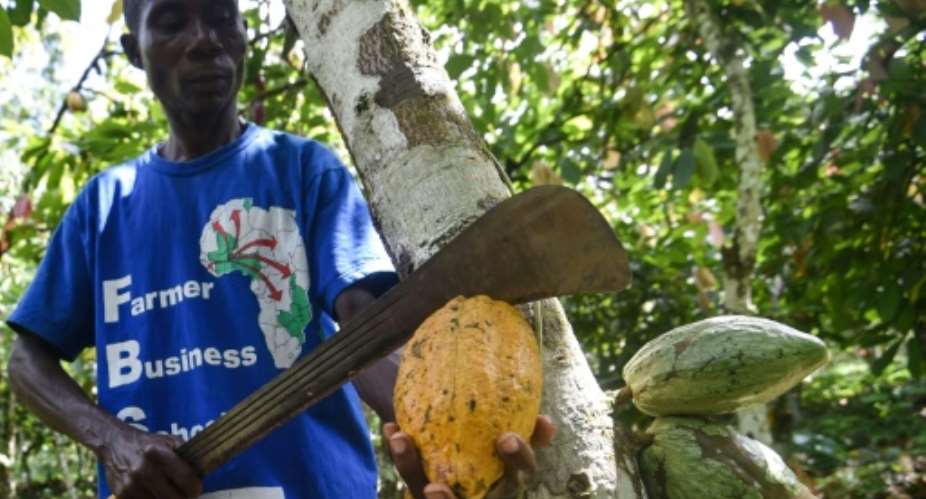Ivorian President Alassane Ouattara is seeking re-election on Saturday, campaigning on his record of economic growth and stability in a country shaken by a civil war nearly a decade ago.
Analysts looking at Ouattara's claims say Ivory Coast's economy has indeed enjoyed strong growth -- the World Bank in August described it as "one of the best performing" south of the Sahara.
But its weaknesses are widespread poverty and income inequality, the fallout of the coronavirus pandemic and the uncertainties of the presidential ballot itself.
Ouattara, who came to power in 2011 after bloody post-election conflict, is accused by critics of sidestepping constitutional constraints in seeking a third term in office.
Since 2010, Ivory Coast's GDP more than doubled from $25.4 billion (21.5 billion euros) to $58.8 billion (49.75 billion euros) last year, making it the fastest-growing economy in West Africa.
Growth since 2011 has been around seven to eight percent annually, driven especially by telecoms and other services, and supported by heavy infrastructure investment, in electricity, roads and drinking water.
Agriculture remains a mainstay, especially cacao, of which Ivory Coast is the world's biggest producer, with 40 percent of the market. Cacao and its derivatives account for 15 percent of GDP, according to the World Bank.
"The Ivorian economy has experienced structural change, but is still too dependent on the public sector. The private sector still does not have enough heft to take over," said Youssouf Carius of investment company Pulsar Partners.
In August, Ouattara said his government had "reversed the poverty curve, which is in clear decline".
According to a study led by the Ivorian National Statistics Institute and the World Bank, the poverty rate fell from 55.4 percent in 2011 to 39.5 percent in 2018. From 2011 to 2019, per-capita income doubled from $1,120 to $2,290.
But other figures show this picture is rather more nuanced.
 Ivory Coast. By Laurence SAUBADU (AFP)
Ivory Coast. By Laurence SAUBADU (AFP)
As the country's population has risen from 20 to 25 million over the same period, there are still 10 million people in poverty, against 11 million a decade ago.
And precarity is widespread -- as many as 90 percent of jobs are in the informal sector.
"Poverty remains a challenge," the World Bank said, pointing out that Ivory Coast lags behind other countries in the region, and other low-middle-income economies, in education and health.
Coronavirus hit
In 2019, as the elections approached, Ouattara launched a billion-dollar two-year poverty alleviation plan, with help for the poorest households.
But within months, coronavirus struck.
Growth in 2020 is expected to fall to 1.8 percent because of the pandemic, with small companies bearing the brunt. More than two-thirds of families are struggling to meet basic needs.
 Abidjan's popular Adjame market was among retail outlets that were shuttered in March when Ivory Coast imposed anti-coronavirus restrictions, since eased. By ISSOUF SANOGO (AFP)
Abidjan's popular Adjame market was among retail outlets that were shuttered in March when Ivory Coast imposed anti-coronavirus restrictions, since eased. By ISSOUF SANOGO (AFP)
However, there could be a rebound to five percent growth next year, which may approach pre-crisis levels in subsequent years.
The government has mustered "an economic, social and humanitarian support plan" for 2020-21, amounting to up to five percent of GDP.
Keys to the rebound are keeping the coronavirus outbreak under control locally, the World Bank said. "Social tensions" could be generated by the pandemic, "especially with the approaching elections," it warned.





 Akufo-Addo spotted ordering chiefs to stand for his handshake
Akufo-Addo spotted ordering chiefs to stand for his handshake
 Akufo-Addo ‘disrespects’ every chief in Ghana except Okyenhene — NDC Communicato...
Akufo-Addo ‘disrespects’ every chief in Ghana except Okyenhene — NDC Communicato...
 Supreme Court clears way for dual citizens to hold key public positions
Supreme Court clears way for dual citizens to hold key public positions
 Be transparent, don’t suppress the truth – Prof. Opoku-Agyemang to Jean Mensa
Be transparent, don’t suppress the truth – Prof. Opoku-Agyemang to Jean Mensa
 ‘I won’t tell the world I was only a driver’s mate during challenges’ – Prof Jan...
‘I won’t tell the world I was only a driver’s mate during challenges’ – Prof Jan...
 We’ll prosecute corrupt officials of Akufo-Addo’s govt – Prof Jane Naana
We’ll prosecute corrupt officials of Akufo-Addo’s govt – Prof Jane Naana
 [Full text] Acceptance speech by Prof Jane Naana Opoku-Agyemang as 2024 NDC Runn...
[Full text] Acceptance speech by Prof Jane Naana Opoku-Agyemang as 2024 NDC Runn...
 Election 2024: Don’t be complacent, we haven’t won yet – Asiedu Nketia cautions ...
Election 2024: Don’t be complacent, we haven’t won yet – Asiedu Nketia cautions ...
 Election 2024: Stop fighting over positions in Mahama’s next govt – Asiedu Nketi...
Election 2024: Stop fighting over positions in Mahama’s next govt – Asiedu Nketi...
 Prof Jane Naana Opoku-Agyemang will restore dignity of vice presidency – Fifi Kw...
Prof Jane Naana Opoku-Agyemang will restore dignity of vice presidency – Fifi Kw...
